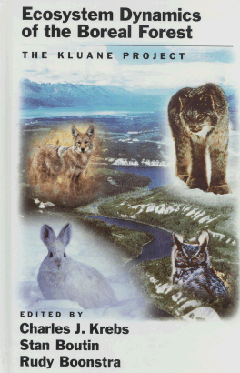


KLUANE RESEARCH GROUP
The Kluane Research Group is comprised of university based researchers, graduate students and government (YTG) biologists. This network studies key dynamics within Canadian boreal forests and collects data on a variety of species, the main ones of which are red squirrel, snowshoe hare and Canada lynx. However, data has also been collected on other species in the Kluane valley and data on some now spans 40+ years. Most of this data has been collected as part of the Community Ecological Monitoring Program, or through a variety of research programs at various institutions across North America.
All work is conducted on the traditional territories of the Kluane First Nations and Champagne-Aishihik First Nations. We could not have done all this without their support and thank them for allowing us to work there.

CANADIAN SOCIETY FOR ECOLOGY AND EVOLUTION - LONG-TERM ECOLOGICAL RESEARCH NETWORK
In May 2017, the Wildlife 70 symposium on long-term research was held in Ontario with a goal of exploring challenges and opportunities of long-term research. Delegates at the meeting expressed support for a 1995 recommendation from the Royal Society of Canada to establish a Long-Term Ecological Research and Monitoring network. Although no formal network has ever been established in Canada, Wildlife 70 delegates discussed that many of the aims of the Royal Society panel could be achieved through harnessing existing programs, many of which are led by individual researchers, or informal collaborative networks. Our working group aimed to provide a platform to this end, and created the long term research section of the Canadian Society for Ecology and Evolution (LTR-CSEE). We continue to help support the improvement of co-ordination among programs and encourage collective opportunities with the goal of one day formalizing a network of researchers and sites. To this end, we recently helped quantify long-term ecological and agricultural research across the United States and Canada (with a paper submitted to Facets) and information that will be uploaded to the CSEE-LTR website.